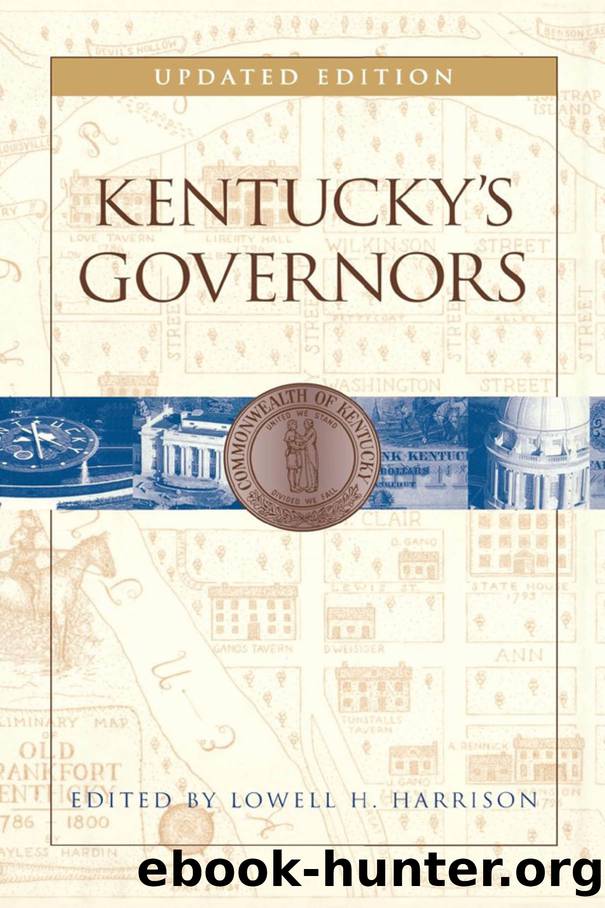Kentucky's Governors by Harrison Lowell H.;

Author:Harrison, Lowell H.; [Harrison, Lowell H.]
Language: eng
Format: epub
Publisher: University Press of Kentucky
Published: 2021-08-15T00:00:00+00:00
AUGUSTUS
OWSLEY
STANLEY
b. May 21, 1867
d. August 12, 1958
Term: 1915â1919
Augustus Owsley Stanley was born on May 21, 1867, in Shelbyville, Kentucky, the son of William Stanley, a Disciples of Christ minister, and his wife, Amanda Owsley, a niece of former governor William Owsley. Having attended Gordon Academy in Nicholasville, young Stanley enrolled first at the Kentucky Agricultural and Mechanical College in Lexington and later at Centre College in Danville, where he received a baccalaureate degree in 1889. After teaching in several Kentucky towns, Stanley read law in the Flemingsburg office of Gilbert Cassiday. Admitted to the bar in 1894, Stanley suffered one of his few political defeats three years later when he lost in his bid to become Fleming County attorney.
Struggling financially, Stanley moved in 1898 from Flemingsburg to Henderson and quickly rose in Democratic councils in western Kentucky. In 1902 the thirty-five-year-old attorney won the first of six terms in the U.S. House. As congressman from Kentuckyâs Second District, Stanley championed the cause of the tobacco growers and encouraged the formation of cooperatives to curb price fixing by the tobacco trust. Leadership in the fight for repeal of the six-cent tax on leaf tobacco made Stanley virtually unbeatable in his district. An unrelenting opponent of trusts, the Kentucky congressman gained national notoriety in his committeeâs investigation of the United States Steel Corporation. Many of the committeeâs recommendations were later incorporated into the Clayton Antitrust Act.
In 1914 Stanley decided to forego certain reelection to a seventh term in the House and announced his candidacy for the U.S. Senate, his lifelong ambition. Vying for their partyâs senatorial nomination were three of the stateâs most popular DemocratsâStanley, former governor J.C.W. Beckham, and incumbent governor James B. McCreary. However, the primary soon evolved into a two-man race between Beckham and Stanley. Beckham, the undisputed leader of the dry faction in his party, hit hard at his opponentâs career-long defense of the whiskey industry. Stanley, in turn, repeatedly disparaged Beckhamâs sincerity on temperance. A celebrated wit, Stanley quipped on one occasion: âBeckhamâs as dry in the country as a dusty road; in the cities heâs so wet you can catch him by the head and feet and wring water out of him.â Yet Stanley could not surmount the public feeling that Beckham âdeservedâ the seat in the Senate that had been denied him six years earlier. On August 1, 1914, Beckham garnered 72,677 votes to Stanleyâs 65,871 and McCrearyâs 20,257.
Stanley decided to seek the governorship as a vehicle for furthering his senatorial goal. In January 1915 Stanley announced his candidacy for the Democratic nomination. He pledged to build better roads, to abolish the prison and contract labor system, andâmost importantâto enforce the county unit law and oppose statewide prohibition. His chief opponent was Henry V. McChesney of Frankfort, an ardent prohibitionist closely allied with the Beckham forces. In primary balloting Stanley emerged victorious in a field of four gubernatorial candidates with 107,585 votes to McChesneyâs 69,722.
In the general election the following November, Stanley faced Republican Edwin P.
Download
This site does not store any files on its server. We only index and link to content provided by other sites. Please contact the content providers to delete copyright contents if any and email us, we'll remove relevant links or contents immediately.
The Secret History by Donna Tartt(16677)
The Social Justice Warrior Handbook by Lisa De Pasquale(11495)
Thirteen Reasons Why by Jay Asher(7808)
This Is How You Lose Her by Junot Diaz(5804)
Weapons of Math Destruction by Cathy O'Neil(5056)
Zero to One by Peter Thiel(4841)
The Myth of the Strong Leader by Archie Brown(4796)
Promise Me, Dad by Joe Biden(4461)
Beartown by Fredrik Backman(4444)
How Democracies Die by Steven Levitsky & Daniel Ziblatt(4427)
Stone's Rules by Roger Stone(4426)
The Fire Next Time by James Baldwin(4356)
100 Deadly Skills by Clint Emerson(4093)
A Higher Loyalty: Truth, Lies, and Leadership by James Comey(4044)
Rise and Kill First by Ronen Bergman(4026)
The David Icke Guide to the Global Conspiracy (and how to end it) by David Icke(3900)
The Farm by Tom Rob Smith(3883)
Secrecy World by Jake Bernstein(3793)
The Doomsday Machine by Daniel Ellsberg(3743)
